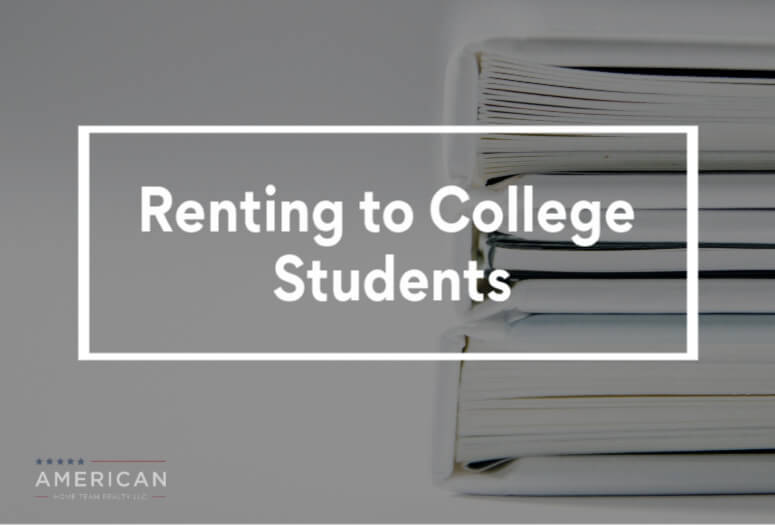Is your investment property in a “college town”?
Here’s how to make renting to college students less of a headache.
If you’re thinking about buying a rental property in a college town (or you already have), you’ll have to consider the pros and cons of renting to college students if you want to get the most out of your investment.
You’re probably nervous about renting to someone who’s stepping out on their own for the first time, but there are a few things you can do to make the experience more worthwhile for you…and your budget.
In this article, we’ll talk about the pros and cons of renting to college students as well as the best ways to minimize your risk.
College Students: Who Are They?
When you think of the phrase “college student,” what comes to mind? If you’re like most people, you probably think of a lazy 18-year-old setting fire to the microwave while trying to cook ramen noodles.
But the truth is that college students probably aren’t who you think they are.

In fact, nearly three-quarters of college students can be identified as non-traditional. That is, they might be parents, financially independent from their parents, or even working full-time. (Remember, even grad students and doctoral candidates are technically “college students.”)
Pros of Renting to College Students
As it turns out, there are a lot of good reasons to rent to college students!
Investment properties located near a college or university have a “built-in demand” from students. (Here in Central Florida, UCF has more than 69,000 students, the highest enrollment in the state.) Sure, the turnover might be high, but it will also mean an endless stream of potential tenants.
Even when your tenants are effectively unemployed, renting to college students can be less financially risky, as many of them have parents that pay for rent. For those that are financially independent, the risk would be no greater than any other tenant.
Worried about keeping up with the comps in your area? No need! Student renters tend to be less fussy about things like new paint and fancy amenities. If it’s bigger than a college dorm room and has air-conditioning, they’re happy!
When it comes to off-campus housing, the law of supply and demand reigns supreme. When renting to college students, you can usually demand higher rents, as you’re competing with on-campus housing. In fact, if you play your cards right, renting out each room in a three-bedroom house can yield more profit than renting out the whole house.
Cons of Renting to College Students
If your tenant happens to be the stereotypical college student living on their own for the first time, they may be more irresponsible. After all, college is usually the time when most people realize that water and electricity aren’t free!
Another thing to keep in mind? Shorter lease terms are not uncommon in college towns. Even students attending the same school for their entire education are unlikely to live in the same place for the entire time. Roommate and income situations can change frequently during young adulthood.

Similarly, you should expect that summer may be a “dry” season. One way to combat this is by having your leases begin and end in the middle of the summer. This can give graduating students time to find a job and move out and incoming students time to get the place set up before classes start.
If you live near a college or university—where student tenants are more likely—there are a few things you can do to minimize your risk and make the experience enjoyable for both parties.
How to Minimize Your Risk
If you decide to accept college students as tenants, you will likely be dealing with young adults who are leaving the nest for the first time. But with the right rules and preparation, renting to college students can be a smart move.

- Draft a lease with clear, specific language and go over in detail at signing. You may have to add specific restrictions that might otherwise go without saying, such as “no fireworks” or “no alcohol” (if your tenants are below the legal age).
- Require co-signers for tenants that don’t have a certain amount of rental or credit history and perform a thorough background check on the co-signers as well. However, all of your communications should go through the tenant (i.e. the student) FIRST. This allows them to be held accountable for their own actions.
- Raise your security deposit to cover any potential damage.
- Don’t include utilities in the rent. If this is the first time your tenant has lived on their own, they might not have realized that all that cold A/C comes at a price.
- Require rental insurance for all tenants. No exceptions.
- Perform maintenance checks often to keep an eye on your investment.
- Hire a property management company to take care of the details, such as background checks, rent collection, maintenance requests, and more.
Conclusion
Renting to college students doesn’t have to be the headache that most landlords assume it is. With a little preparation (and some help from the pros), you can create a system that benefits tenant and property owner alike.
At American Home Team Realty, our goal is to make life easier for you. We are a full-service property management company specializing in smaller residential profiles. What does that mean for you? It means you won’t be overlooked in favor of huge apartment complexes. You are our #1 priority!
Curious to learn more? Call today at (407) 359-9500 or send a message to see how we can help you!


